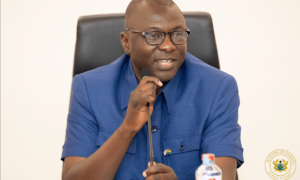Going forward, we’ll need to explore the potential of Public-Private Partnerships for infrastructure dev’t – Bawumia
Going forward, we’ll need to explore the potential of Public-Private Partnerships for infrastructure dev’t – Bawumia

Vice President Dr Mahamudu Bawumia has said that going forward, there will be a need to explore the potential of public-private partnerships, shifting the burden of financing infrastructure development to the private sector.
This he said, will free up budgetary funds for investments in other sectors.
He says they will also need to look at new funding schemes, leveraging on best practices and local dynamics.
This requires bold and innovative thinking, he said.
“I am confident that all stakeholders will come up with sustainable solutions to our infrastructure financing gap,” he said in a Facebook post after addressing stakeholders in the road infrastructure provision system.
He challenged the stakeholders to critically evaluate the current models for financing road construction and explore ways to bridge the huge financing gap.
According to recent estimates, Dr Bawumia said, Ghana requires $12 billion to clear the maintenance backlog and enable the network of about 94,203km to be at an optimal level.
However, he said, current funding levels only cover about 38% of this requirement, leaving a significant shortfall.
This gap translates into deteriorating road conditions, increased maintenance costs, and missed economic opportunities, he said.

In his address during the engagement, Dr Bawumia stated that Prior to abolishing road tolls in Ghana, the government was raking in GHS 70 million yearly from the collection.
However, he said, if everybody paid the tolls, the state could have generated GHS2 billion per annum.
To that end, Dr Bawumia has called for a broad-based tolling system as Ghana seeks to reintroduce the tolling system.
Dr Bawumia said “Tolling right now is designed in many countries, you pay specific tolls at particular points. So you are going on the Tema-Accra motorway, you have a toll booth over there, you go to Kasoa there is a toll booth over there. But my view is that if we are going into tolling we need to think about broad-based tolling.
“The current architecture that we have in tolling really turns to exclude even the wealthier part parts of the population. So I live in Cantonments, East Legon, and Ridge which are the high-earned neighborhoods, I will not see a toll, but if I live in Kasoa or somewhere else I am likely to meet a toll on the way. There seems to be an inequity in tolling. I believe that we should look at broad-based tolling.
“Why shouldn’t everybody pay? When we put taxes on fuel we look at some modeling on tolling as we were looking at the issue of tolling, we looked at the current toll revenue as before we abolished the tolls, there was about 70 million Ghana Cedis, per year. What if everybody paid, so you put a tax on fuel, for example, 30 pesewas, meaning you move you pay, if you don’t move you don’t pay. If everybody paid you could generate about 2 billion Ghana Cedis a year compared to 70 million. That was the thinking and I think we should be thinking about methods that we could make the tolling more broad-based then we all contribute then the revenue will be much higher. So if you can find a way to do it digitally or whatever.
The government is looking forward to bring back the road toll after its cessation in 2021.
The Finance Minister, Dr. Mohammed Amin Adam disclosed that Cabinet has approved a framework established to facilitate the process of the reintroduction of the tolls in 2025.
The Minister made this statement while presenting the mid-year budget review in Parliament on Tuesday, July 23.
Government canceled road toll collections in 2021 after introducing the e-levy which government said was to substitute the road tolls.
However, the e-levy has failed to live up to its promise prompting government to bring back the tolls in 2025.







